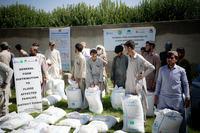Through its National Disaster Management Authority, the Pakistani Government – which has declared a national emergency – is leading the response in coordinating assessments and directing humanitarian relief to affected people.
Since June, flooding and landslides caused by heavy monsoon rainfall have brought widespread destruction across Pakistan, creating its “biggest challenge” in decades, according to Julien Harneis, UN Resident Coordinator and Humanitarian Coordinator in the country.
He has called for “burden-sharing and solidarity” internationally in the wake of the “climate-change driven catastrophe.”
According to news reports, a third of the country could be left underwater as the monsoon weather continues, and the death toll is likely to rise as more rivers burst their banks, washing away roads and bridges, with many communities in the mountainous northern regions cut off.
Access constraints
WFP has been asked to assist in the emergency response, and staff are working with the authorities and partners to expand food assistance.
The aim is to reach nearly half a million people in the badly hit provinces of Balochistan, where the agency already supports nearly 42,000 people, and Sindh.
However, distributions are currently on hold as floodwaters create access constraints across the country.
Waters have also disrupted lives and livelihoods in the provinces of Khyber Pakhtunkhwa and Punjab.
More than 100 bridges and some 3,000km of roads have been damaged or destroyed, nearly 800,000 farm animals have perished, and two million acres of crops and orchards have been hit.
UN funding appeal
Mr. Harneis has warned that the humanitarian situation is expected to worsen, with diseases and malnutrition expected to rise along with the number of districts reporting that they have been affected.
The UN is set to launch a $161 million flash appeal for Pakistan on Tuesday.
The funding will provide critical food and cash assistance to nearly one million people in districts in Balochistan, Sindh, Punjab and Khyber Pakhtunkhwa provinces.
More than $34 million is urgently needed to enable the scale-up.


-75x75.png)
